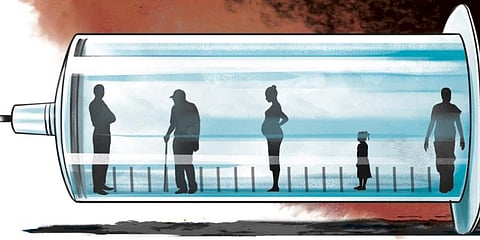

India should have learnt its lessons from the two Covid-19 waves, the first with the less transmissible founder virus variant extended over a period of over 10 months and the second with highly transmissible variants including Delta (B.1.617.2) that caused four times the number of confirmed infections and deaths (actual numbers are probably many times higher) in four months. These overwhelmed our healthcare system. The second wave was more aggressive because we let our guard down and permitted large gatherings without insisting on Covid-appropriate behaviour.
The Indian Institute of Technology, Kanpur has predicted an imminent ‘third wave’. It is high time that we, as a nation, took stock of the situation and acted quickly and decisively to avert or minimise a third wave.
The question now before us is not whether India will have a third wave, but whether we have plans in place to prevent one. What should we do by way of comprehensive and meticulous planning?
The 16 January 2021 roll-out of vaccines met with vaccine hesitancy (due to lack of public education) initially and shortage (due to lack of advance purchase plans) later—both factors resulting in inadequate inoculation cover. The Union government’s move to centralise purchase of vaccines and distribute them free through the states will improve equitable availability; despite all this, in the last six months, as of July 10, only 7.7% of Indians have received two doses and 32.1% a single dose; it may take many more months before we have adequate (60-80%) vaccination cover of the population to avert the risk of a third wave. What are our other options?
Right from the onset of the pandemic, we had an effective, readily available but grossly under-utilised tool—the social vaccine. Its effective deployment could have minimised the impact of the second wave. It is never too late; if we deploy this effectively now, we can hope to mitigate the impact of any emergent, more infectious, even vaccine-resistant viral variants—in other words, a potential third wave.
Effective implementation of the social vaccine requires giving out authentic information, educating the entire population, involving all stakeholders and communicating through all available platforms. We literally need to go on a publicity blitzkrieg and convey the message, ‘Adopt Covid-appropriate behaviour’. Additional messages on vaccine safety and efficacy should be included. This exercise is best done in each panchayat and ward nationwide.
We should avoid crowds at all costs, especially as the Delta variant can be airborne in enclosed spaces. The number of people inside enclosed spaces should be strictly restricted; open-air markets should be encouraged along with everyone wearing a mask and maintaining a physical distance of at least an arms length.
Public gatherings in enclosed spaces and public transport should only be allowed with adequate cross-ventilation, with air-conditioners switched off and everyone wearing a double mask. Mandatory requirement of vaccination and Covid-appropriate behaviour for entry into enclosed public facilities—transport, shopping areas, malls, meetings and places of worship—will surely curtail spread of coronavirus infection.
The vaccination and Covid status (active or recovered) of each person is Aadhaar-linked. Our software professionals must quickly develop an internet-based app to verify vaccination status and Covid-infection status of any given individual using a laptop or smartphone at the entrance to enclosed public facilities; those without a mask should buy one (made available at entry) and wear it properly before entering—not to forget hand sanitisation.
The recent bold step by Arunachal Pradesh to permit entry only to vaccinated people can be emulated by other states to protect their population.
Urban India, well-connected by transport, nationally and internationally, has borne the brunt of this pandemic so far. Rural India, with ~65 % of India’s population, has been less exposed to the virus—the more remote the village, the greater the proportion of vulnerable subjects. It makes eminent sense to accelerate vaccination from periphery to Centre. Well-equipped mobile vans to take vaccines to remote rural areas is a priority. Vaccination without prior registration enables non-tech-savvy rural folk to access jabs readily. Regulatory agencies should quickly license one or more vaccines to permit ready access to the jabs for everyone at any time.
Bridging studies on vaccination in children should be quickly completed, analysed and, once safety is assured, universal Covid inoculation for children adopted. Online schooling should continue until children can be vaccinated at camps in schools before rejoining physical classes. Prioritised vaccination of disadvantaged rural school children—for whom access to online education is impossible—will enable their early return to schools, access to midday meals, education and school-health programs, all vital for their well-being.
Reversible contraception should be advised for newlywed couples till both partners are fully vaccinated before pregnancy. Households with pregnant women should scrupulously adopt Covid-appropriate behaviour. Counselling to overcome vaccine hesitancy and inoculating all pregnant women with vaccines considered safe in pregnancy are necessary steps.
Antenatal clinics, ultrasound scan centres and labour rooms should be safe for pregnant women; effective Covid-prevention steps should be in place along with routine thermal screening and RT-PCR/rapid antigen testing, triage of pregnant women with fever in a separate designated area till Covid-test reports are available and segregation of non-Covid pregnant women from those with Covid to prevent cross-infection.
Emerging evidence that men, the elderly and those with comorbidities who are at highest risk of developing serious disease have reduced immune response to both natural infection and vaccination points to a research priority—will a third dose of an appropriate vaccine enhance their protection from serious disease and death?
Systematic ongoing studies to identify new mutational variants is mandatory, with a special focus on any region showing a rapid increase in epidemic momentum.
If we do all this, with will and wisdom—and only if we do all this as a nation—we can be confident and avert even the remote probability of a third wave.
Dr M S Seshadri
Medical Director, Thirumalai Mission Hospital, Ranipet
Dr T Jacob John
Former Professor of Clinical Virology, CMC, Vellore
(mandalam.seshadri@gmail.com, tjacobjohn@yahoo.co.in)